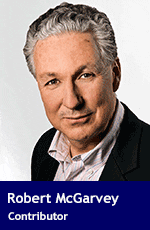 There’s a lot of talk these days about diversifying Alberta’s economy. (I’m pretty sure we wouldn’t be having this conversation if oil was at $100 per barrel but that’s not the case.)
There’s a lot of talk these days about diversifying Alberta’s economy. (I’m pretty sure we wouldn’t be having this conversation if oil was at $100 per barrel but that’s not the case.)
It’s time for Albertans to develop the full potential of our greatest natural resource: people. But before we begin to change direction we must purge ourselves of some wrong-headed thinking.
Perhaps the most egregious fallacy that Albertans carry today is the idea that the market is the best instrument to determine our future; that getting out of the way is the best thing governments can do to support the economy.
What has this attitude meant for Albertans?
Over the past four decades, the oil and gas industry has grossed roughly $3.5 trillion of value (and tens of trillions of market capitalization), developing Alberta’s publicly-owned energy resources. Regrettably, the Age of Oil is ending – leaving Albertans broke, with limited options going forward.
It’s time to wake up and write a new future. We could do worse than learn from our past.
In the early 1960s, the Alberta government (under Social Credit Premier Ernest Manning) defied conventional market realities when it launched the Great Canadian Oil Sands (GCOS) project.
Forecasters could see conventional oil and gas wouldn’t last forever in our province, so the government got innovative. Far from leaving our future to the market, it worked with experts in the oil industry to define a workable business solution that would unlock the potential of the oilsands. The result was a publicly-sponsored, private-sector company called Great Canadian Oil Sands.
It was clear that global capital markets (investment banks and other institutional investors) wouldn’t finance an unproven heavy oil venture, so GCOS went directly to the people of Alberta.
Albertans were invited to invest in their own future. More than 100,000 Albertans (representing roughly 27 per cent of households at the time) purchased $1,500 debentures ($12,000 in 2017 dollars), taking an equity position in Alberta’s future. That was a lot of money in 1962 – consider that the average house price in Alberta at that time was only $12,500.
Following this successful primary financing, a Canadian subsidiary of U.S.-based Sun Oil Co. entered the picture, investing an additional $250 million to get the project up and running near Fort McMurray.
It was the largest single private investment to that point in Canada’s history. GCOS constructed and operated the first commercial oilsands plant, with production beginning in 1967. Today, Suncor, the successor to GCOS, produces more than half a million barrels of oil a day, almost 23 per cent of Alberta’s total oilsands production.
It was an early example of average Albertans investing in their future and defying conventional logic in order to change a market reality.
And it’s not the only example of Albertans investing in their own future.
The Alberta Energy Co. (AEC) is a classic example. AEC was incorporated in September 1973. Like GCOS, AEC was a government-sponsored private-sector initiative designed to accomplish economic and political goals.
AEC’s mandate encompassed a variety of roles in the conventional energy industry – and much more. Premier Peter Lougheed felt Albertans should be doing as much of the secondary upgrading and refining of our crude oil as possible, something the market discouraged.
AEC was financed in much the same fashion as GCOS. The province invested $75 million (half the initial capital) and then sold another $75 million in shares to 60,000 Albertans. AEC eventually merged with PanCanadian Energy. The combined companies became EnCana, now a significant player in the industry.
The challenges are different today. It’s not energy development that’s needed, but a diversification of the economy to unleash the technology potential of Alberta and Albertans, and create a more prosperous future.
It’s a big challenge, but as former General Electric CEO Jack Welch used to say, “Control your own destiny or someone else will.”
As Manning and Lougheed discovered, if government gets its role right, Albertans will invest directly and heavily in their future.
Robert McGarvey is an economic historian and former managing director of Merlin Consulting, a London, U.K.-based consulting firm. Robert’s most recent book is Futuromics: A Guide to Thriving in Capitalism’s Third Wave.
Robert is a Troy Media Thought Leader. Why aren’t you?
The views, opinions and positions expressed by columnists and contributors are the author’s alone. They do not inherently or expressly reflect the views, opinions and/or positions of our publication.

